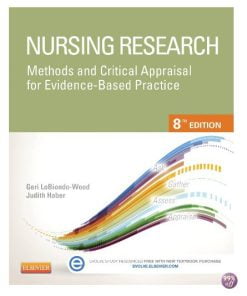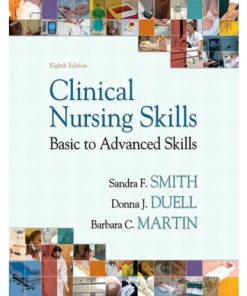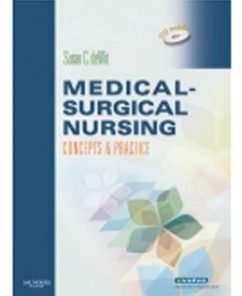Test Bank for Advanced Accounting, 2nd Edition : Hamlen
$35.00 Original price was: $35.00.$26.50Current price is: $26.50.
Test Bank for Advanced Accounting, 2nd Edition : Hamlen
Instant download Test Bank for Advanced Accounting, 2nd Edition: Hamlen pdf docx epub after payment.

Product details:
- ISBN-10 : 1618530976
- ISBN-13 : 978-1618530974
- Author: Susan S. Hamlen (Author), Ronald J. Huefner (Author), James A. Largay (Author)
From the Authors: We wrote this book with two major objectives in mind. First, we seek to reflect the changing topical emphases and content in the advanced accounting course; coverage is completely updated for new developments concerning applicable reporting issues and requirements, including the newest FASB and GASB pronouncements and proposals. We extensively discuss International Financial Reporting Standards where appropriate throughout the book. Second, we write from the perspective of enhancing teachability; many of the topics in this course are complex and require careful explanation. We highlight the major issues in each topic and provide the student with the background and logical structure needed to analyze these issues, rather than merely explaining current practice. This view equips students to analyze and assess future reporting developments. This book is the product of extensive market research including focus groups, market surveys, class tests, manuscript reviews, and interviews with faculty from across the country. Advanced Accounting is intended for use, at either the undergraduate or graduate level, in the course commonly known as advanced accounting. It is also designed to be used in courses focusing on mergers and acquisitions that are often part of the MBA curriculum or that are offered as a non-degree, professional development program.
Table of contents:
chapter 1 Business Combinations 1 The Legal Form of Business Combinations 4 The Accounting Concept of a Business Combination 5 Accounting for Business Combinations Under the Purchase Method 7 Disclosure Requirements 16 The Sarbanes-Oxley Act of 200219 Electronic Supplement to Chapter 1 ES1 chapter 2 Stock Investments?Investor Accounting and Reporting 27 Accounting for Stock Investments 27 Equity Method of Accounting?A One-Line Consolidation 31 Interim Acquisitions of an Investment Interest 38 Investment in a Step-By-Step Acquisition 40 Sale of an Equity Interest 40 Stock Purchases Directly from the Investee 41 Investee Corporation With Preferred Stock 41 Extraordinary Items, Cumulative-Effect-Type Adjustments, and Other Considerations 42 Disclosures for Equity Investees 43 Testing Goodwill for Impairment 45 chapter 3 An Introduction to Consolidated Financial Statements 63 Business Combinations Consummated through Stock Acquisitions 63 Consolidated Balance Sheet at Date of Acquisition 67 Consolidated Balance Sheets after Acquisition 71 Allocation of Excess to Identifiable Net Assets and Goodwill 73 Consolidated Income Statement 80 Push-Down Accounting 81 Preparing a Consolidated Balance Sheet Worksheet 83 Electronic Supplement to Chapter 3 ES19 chapter 4 Consolidation Techniques and Procedures 101 Consolidation Under the Equity Method 101 Locating Errors 108 Excess Allocated to Identifiable Net Assets 108 Consolidated Statement of Cash Flows 114 Preparing a Consolidation Worksheet 119 Electronic Supplement to Chapter 4 ES27 chapter 5 Intercompany Profit Transactions?Inventories 147 Intercompany Inventory Transactions 148 Downstream and Upstream Sales 153 Unrealized Profits from Downstream Sales 155 Unrealized Profits from Upstream Sales 158 Consolidation Example?Intercompany Profits from Downstream Sales 161 Consolidation Example?Intercompany Profits from Upstream Sales 163 Electronic Supplement to Chapter 5 ES49 chapter 6 Intercompany Profit Transactions?Plant Assets 185 Intercompany Profits on Nondepreciable Plant Assets 185 Intercompany Profits on Depreciable Plant Assets 190 Plant Assets Sold at Other Than Fair Value 198 Consolidation Example?Upstream and Downstream Sales of Plant Assets 200 Inventory Items Purchased for Use as Operating Assets 202 Electronic Supplement to Chapter 6 ES65 chapter 7 Intercompany Profit Transactions?Bonds 221 Intercompany Bond Transactions 221 Constructive Gains and Losses on Intercompany Bonds 222 Parent Company Bonds Purchased by Subsidiary 224 Subsidiary Bonds Purchased by Parent 230 Electronic Supplement to Chapter 7 ES75 chapter 8 Consolidations?Changes in Ownership Interests 249 Acquisitions During an Accounting Period 249 Piecemeal Acquisitions 253 Sale of Ownership Interests 255 Changes in Ownership Interests from Subsidiary Stock Transactions 260 Stock Dividends and Stock Splits by a Subsidiary 265 Electronic Supplement to Chapter 8 ES97 chapter 9 Indirect and Mutual Holdings 283 Affiliation Structures 283 Indirect Holdings?Father-Son-Grandson Structure 285 Indirect Holdings?Connecting Affiliates Structure 289 Mutual Holdings?Parent Stock Held by Subsidiary 293 Subsidiary Stock Mutually Held 303 Electronic Supplement to Chapter 9 ES107 chapter 10 Subsidiary Preferred Stock, Consolidated Earnings per Share, and Consolidated Income Taxation 319 Subsidiaries with Preferred Stock Outstanding 319 Parent-Company and Consolidated Earnings per Share 327 Subsidiary with Convertible Preferred Stock 329 Subsidiary With Options and Convertible Bonds 330 Accounting for Income Taxes of Consolidated Entities 332 Income Tax Allocation 333 Separate-Company Tax Returns with Intercompany Gain 336 Effect of Consolidated and Separate-Company Tax Returns on Consolidated Procedures 338 Business Combinations 348 Financial Statement Disclosures for Income Taxes 351 Electronic Supplement to Chapter 10 ES115 chapter 11 Consolidation Theories, Push-Down Accounting, and Corporate Joint Ventures 371 Comparison of Consolidation Theories 372 Illustration?Consolidation Under Parent-Company and Entity Theories 375 Push-Down Accounting and Other Basis Considerations 384 Joint Ventures 391 Accounting for Variable Interest Entities 395 Electronic Supplement to Chapter 11 ES149 chapter 12 Foreign Currency Concepts and Transactions 413 Foreign Exchange Concepts and Definitions 413 Foreign Currency Transactions Other than Forward Contracts 416 FASB Statement No. 133: Accounting for Derivative Instruments and Hedging Activities 421 Accounting for Hedge Contracts: Illustrations of Cash Flow and Fair Value Hedge Accounting Using Interest Rate Swaps 426 Foreign Currency Derivatives and Hedging Activities 432 chapter 13 Foreign Currency Financial Statements 455 Objectives of Translation and the Functional Currency Concept 455 Application of the Functional Currency Concept 457 Illustration: Translation Under Statement No. 52 461 Illustration: Remeasurement Under Statement No. 52 468 Hedging a Net Investment in a Foreign Entity 472 chapter 14 Segment and Interim Financial Reporting 513 Segment Reporting Under FASB Statement No. 131 513 Interim Financial Reporting 519 Guidelines for Preparing Interim Statements 521 chapter 15 Partnerships?Formation, Operations, and Changes in Ownership Interests 539 Nature of Partnerships 539 Initial Investments in a Partnership 540 Additional Investments and Withdrawals 542 Partnership Operations 543 Profit and Loss Sharing Agreements 544 Changes in Partnership Interests 550 Purchase of an Interest from Existing Partners 551 Investing in an Existing Partnership 554 Dissolution of a Continuing Partnership Through Death or Retirement 557 Limited Partnerships 559 chapter 16 Partnership Liquidation 575 The Liquidation Process 575 Safe Payments to Partners 579 Installment Liquidations 581 Cash Distribution Plans 586 Insolvent Partners and Partnerships 590 chapter 17 Corporate Liquidations and Reorganizations 607 Bankruptcy Reform Act of 1978607 Liquidation 610 Illustration of a Liquidation Case 611 Reorganization 619 Financial Reporting During Reorganization 623 Financial Reporting for the Emerging Company 624 Illustration of a Reorganization Case 625 chapter 18 An Introduction to Accounting for State and Local Governmental Units 643 Historical Development of Accounting Principles for State and Local Governmental Units 643 Overview of Basic Governmental Accounting Models and Principles 645 The Financial Reporting Entity 655 Comprehensive Annual Financial Report 656 chapter 19 Accounting for State and Local Governmental Units?Governmental Funds 679 The General Fund 679 Accounting for the General Fund 679 Special Revenue Funds 689 Permanent Funds 690 Capital Projects Funds 691 Special Assessment Activities 695 Debt Service Funds 696 Governmental Fund Financial Statements 698 Preparing the Governmentwide Financial Statements 700 chapter 20 Accounting for State and Local Governmental Units?Proprietary and Fiduciary Funds 723 Proprietary Funds 723 Internal Service Funds 724 Enterprise Funds 727 Proprietary Fund Financial Statements 730 Fiduciary Funds 734 Agency Funds 734 Trust Funds 736 Preparing the Governmentwide Financial Statements 739 Required Proprietary Fund Note Disclosures 740 chapter 21 Accounting for Not-For-Profit Organizations 749 The Nature of Not-For-Profit Organizations 749 Not-For-Profit Accounting Principles 750 Voluntary Health and Welfare Organizations 755 "Other" Not-For-Profit Organizations 761 Nongovernmental Not-For-Profit Hospitals and Other Health Care Organizations 762 Private Not-For-Profit Colleges and Universities 767 Appendix A SEC Influence on Accounting A-2 The 1933 Securities Act A-1 The Securities Exchange Act of 1934 A-2 The Sarbanes-Oxley Act A-2 The Registration Statement for Security Issues A-3 The Integrated Disclosure System A-3 SEC Developments A-5 Appendix B Estates and Trusts B-1 Creation of an Estate B-1 Probate Proceedings B-1 Administration of the Estate B-2 Accounting for the Estate B-3 Illustration of Estate Accounting B-4 Accounting for Trusts B-8 Glossary G-1 Index I-1
People also search:
Advanced Accounting
Advanced Accounting Hamlen
Advanced Accounting Hamlen 2nd
Advanced Accounting Hamlen 2nd Test Bank
Test Bank for Advanced Accounting, 2nd Edition : Hamlen Download
Related products
Test Bank
Test Bank for Decision Support and Business Intelligence Systems, 9th Edition: Efraim Turban











